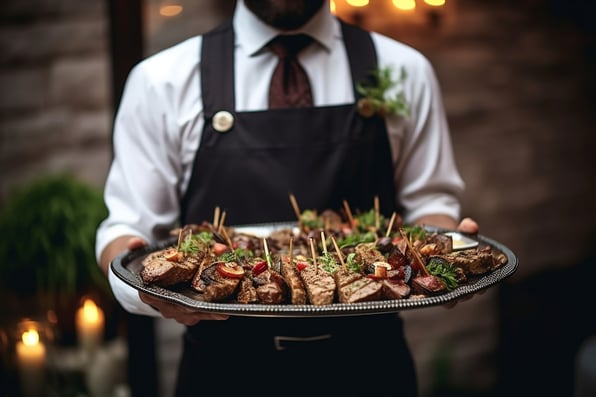Mega events such as World Expos, Climate Summits, the Olympics, or the FIFA World Cup attract an extraordinary influx of international visitors beyond what any major city is usually prepared to expect.
Although these grand gatherings offer host cities unparalleled opportunities to stimulate economic growth, establish their cultural identity on a global stage and leave a legacy, they also pose major logistical challenges impacting transportation and hospitality infrastructure.
The Impact of Major International Events on Hospitality

Mega events like World Expos generate a significant surge in demand, driving occupancy rates to near capacity and creating revenue growth opportunities for both established and emerging hotel brands.
For a short window, premium pricing is often the norm as global visitors flock to the host city, testing the limits of the hospitality infrastructure.
The broader hospitality ecosystem also experiences profound effects during these periods of increased demand. As visitors seek accommodations, there is a ripple effect that impacts local businesses, from restaurants and bars to transportation and entertainment services.
Successful coordination between hotels, local businesses, and city authorities is crucial in maintaining service quality and meeting the expectations of international guests.
The Role of F&B during Mega Events
Food & Beverage (F&B) plays a critical role not only within the immediate event location but also across the broader city. Operators must quickly scale to meet the increased demand while maintaining high standards of quality and service, both for benefit of new customers and their existing base.
The increased diversity of visitors requires a wide range of offerings, from quick and healthy bites to fine dining, with each city and event requiring its own optimal mix of outlets. As the event location becomes a focal point, surrounding hotel restaurants and other venues with F&B components like malls and food halls also experience an influx of guests and ensuring smooth service across all areas becomes vital to providing a consistent and high-quality experience for attendees and making sure existing loyal customers are not disappointed with a reduced service quality.
Mega events also present unique opportunities to redefine visitor engagement through hospitality and F&B. These sectors go beyond offering services, acting as vital touchpoints
for creating immersive and memorable experiences that resonate with attendees long after the event. Beyond meeting basic demands, F&B is particularly significant in shaping perceptions of the event and the host city. By incorporating local culinary traditions, venues can establish an authentic connection with visitors and create a deeper, more immersive experience for eventgoers.
Strategic F&B Curation in Hotel Destinations

Not all hotels are well placed to adapt to surging demand from major international events. However, venues with flexible dining configurations, centralised food service hubs, and creative reuse of existing spaces enable hotels to meet increased demand while optimising efficiency.
Strategically approaching Food & Beverage (F&B) to support increased demand during major international events requires a comprehensive, well-coordinated plan that considers the scale, diversity, and unique expectations of event attendees.
This might involve expanding the number of outlets with a property, creating temporary pop-ups or food stalls, and increasing the availability of local and international options to cater to a wide range of tastes and dietary preferences.
As we’ve seen during major events like Expo 2020 Dubai, there is also an expectation for F&B to align closely with the event's theme and the city's identity. For instance, highlighting local cuisine, showcasing local ingredients, and offering special menus directly influenced by the event can help create an overall synergy.
Collaborations with local chefs, food innovators, and event sponsors can further elevate the food scene, turning F&B into a key part of the entertainment and overall event atmosphere.
By proactive planning for such scenarios, hotels can ensure they remain agile, delivering high-quality experiences to guests and supporting the local hospitality ecosystem.
Adaptive Urban Planning and Legacy Infrastructure

Large scale events demand visionary urban planning to prevent “ghost infrastructure” and ensure enduring utility. Adaptive reuse principles position F&B venues and hospitality spaces as lasting assets, benefitting local communities long after the event concludes.
Scalable food halls and mixed-use complexes exemplify this approach, fostering sustainable growth while maintaining cultural vibrancy
Expo City Dubai, for instance, illustrates how it is possible to adapt event-focused infrastructure developed for Expo 2020 into thriving multi-use hubs for communities far beyond the event. By fostering economic activity, supporting local businesses, and enhancing urban ecosystems, adaptive reuse not only creates long-term value but also ensures continuity through the strength of a resilient supply chain.
Achieving Sustainable F&B and Hospitality During Major International Events
.jpg?width=970&height=647&name=DSC03754%20(1).jpg)
As demand increases during mega-events, maintaining sustainability becomes significantly more challenging for F&B operators and hospitality providers. With the pressure to scale operations and meet heightened expectations, it’s essential for businesses to implement comprehensive strategies that balance high demand with environmental responsibility.
This includes carefully planning resource management, sourcing sustainably, and minimising waste, all while ensuring that sustainability targets are met despite the complexities of large-scale event hosting.
To learn how we delivered COP’s most sustainable F&B offering to date, read our full COP28 Case Study
What’s Next for Mega-Event Hospitality

Hosting large-scale events requires a city to balance innovation, sustainability, and cultural representation with extremely high levels of service quality across all hospitality touch points.
When discussing “Stadiums & Mega Events | Hospitality at the Heart of Mega-Event Success” TGP International’s Simon Wright had the chance to explore a range of strategies for accommodating global surge.
A key takeaway and a signpost for future trends in this space is the necessity for close collaboration among multiple stakeholders. This requires early-stage coordination between event organisers, government entities, hospitality operators, and F&B service providers like TGP to ensure effective planning and strategy.
-1.png?width=3330&height=698&name=TGP%20International%20Logo%20White%20(1)-1.png)

.png?width=596&name=MicrosoftTeams-image%20(23).png)

